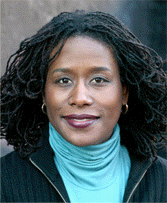Next Door
A Memoir
Jennifer Baszile
(Touchstone/S&S)

By contrast, Baszile grew up in what she calls "PV." Palos Verdes: the doctors and lawyers and politicians and her father with his $10,000,000 a year aluminum plant, mom at the charity balls, the two girls: one at Berkeley, the other at Columbia.
Jennifer's big problems in Next Door are not how to get the crack people out of the building across the street, or how to get food stamps out of the County Welfare Department without waiting six hours in line, or how to get into Long Beach Junior College while balancing a job at MacDonalds and the babysits.
No, Jennifer's biggest challenges, at least ones that occupy the most pages in Next Door, are (1) How to apply makeup for the deb dance without looking like the star in a Japanese "kabuki" (her words, not mine); and (2) How to get her hair straightened without frying her brain.
- Four minutes left, but I couldn't be sure because my eyes had filled with tears of alarm and pain. A blazing, blistering sensation overtook me. I wondered how long until the chemicals would penetrate my scalp, corrode my skull, and liquefy my brain. But I couldn't ponder the question too long because a splitting sensation at the crown of my head began. It felt as though the chemical had broken open my scalp and made it weep actual tears.
This is a strange interlude in a book which is has the unstated theme of black pride: going through what we used to call "conking," a torture that our mothers and fathers put up with a half a century ago in order to get "white" hair.
Baszle shows herself to be brave, if not foolhardy. When she's in the second grade, she takes on three toughs who insult her. She's the only black girl at the high-school prom, and when no one offers to dance with her she goes over to where the guys are huddled together and demands that one of them join her. "I looked good dancing and could feel a few of the girls watching me," she writes: "There I was, barefaced but really having a good time."
- Meanwhile the boy seemed so unsure of what to do with his body that he broke into a jumping jack halfway through the song. I tried not to laugh. White boys really were clueless about dancing.
In the climax of Next Door Jennifer battles it out with her father, years of silent anger boiling over. He won, but, ultimately, they both lost. "Until that moment, I don't think Dad knew just how much he'd taught me, just how much we felt in common. I don't think he realized that my California girlhood had instilled as much rage in me as his Louisiana boyhood had instilled in him."
- Maybe of all the things he detested, for as much as he worked to make it that way, he hated me for that more than anything.